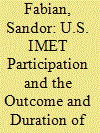| Srl | Item |
| 1 |
ID:
167178


|
|
|
|
|
| Summary/Abstract |
Following Russia’s annexation of Crimea and its initial actions in eastern Ukraine in 2014, the term hybrid warfare has received much public attention. Many have argued that the Russian actions we saw in Ukraine were part of a completely new strategy while others have suggested that there was nothing new in Russia’s actions. This article takes a critical look at these claims. Through the assessment of the history of the term hybrid warfare and a rigorous analysis of the so-called Gerasimov doctrine, this study finds that the Russian hybrid warfare strategy is rather a western myth than a formal comprehensive Russian strategic concept. Additionally, through the assessment of the Russian use of information operations and the way she has utilised the cyberspace in several recent conflicts, the study finds that against all claims Russia did not make these areas its main battlefield, but rather has been using them in support of its traditional concepts.
|
|
|
|
|
|
|
|
|
|
|
|
|
|
|
|
| 2 |
ID:
178642


|
|
|
|
|
| Summary/Abstract |
The United States has provides international military education and training (U.S. IMET) to military personnel from more than 100 countries annually. In spite of this, the effects of such training have received limited study in international relations literature. This article explores how these programmes affect the outcome and duration of insurgencies. It theorises that military education and training received in the U.S. improves the human capital of recipient state militaries. This improvement makes the overall military forces of incumbent governments more capable and effective in their fights against insurgents, leading to increased probabilities of government victories. This analysis also argues that improvement in incumbent governments’ military capabilities incentivizes insurgents to disperse, hide, and not engage government forces in open battles, resulting in prolonged conflicts. The statistical analysis of a new, merged dataset including detailed information on insurgencies and U.S. IMET participation between 1976 and 2003 supports both arguments.
|
|
|
|
|
|
|
|
|
|
|
|
|
|
|
|